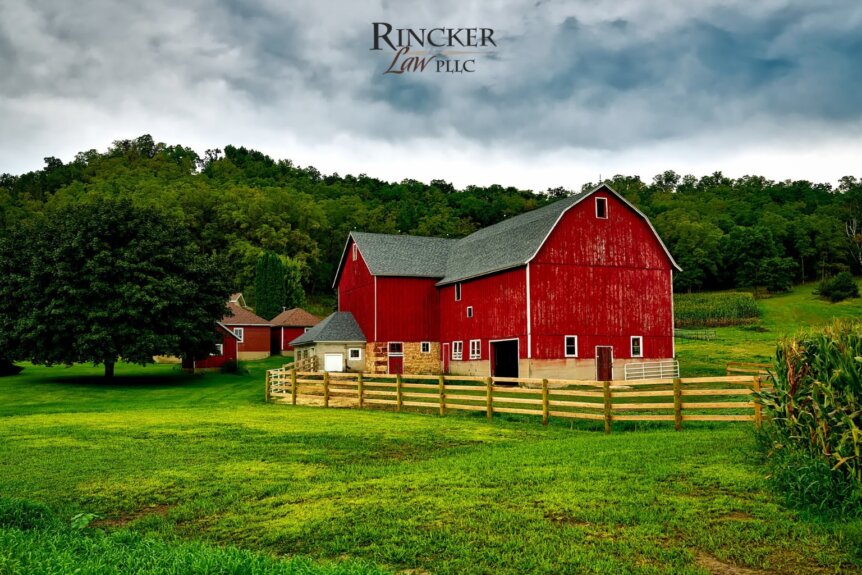For many Illinois farm families, the land is more than just soil and crops, it’s a legacy built over generations. Unfortunately, without the right legal planning, that legacy can be torn apart by disputes, probate delays, and tax burdens. In this article, How to Pass Down the Family Farm in Illinois Without a Legal Battle, we share key strategies for protecting your operation, preserving family relationships, and ensuring a smooth transition to the next generation.
Why Passing Down a Farm Is Different from Other Inheritances
A family farm isn’t like a savings account or a house. It’s often a combination of land, equipment, business interests, and sentimental value. Unlike liquid assets, a farm can’t easily be split among heirs without affecting its operation.
When there’s no plan in place, farms often end up in probate court, where decisions are made by a judge instead of the family. This can lead to forced sales, strained relationships, and even the loss of farmland that’s been in the family for decades.
Step 1: Start the Conversation Early
One of the most common mistakes is waiting too long to talk about succession. These conversations can be uncomfortable, but they’re essential.
Questions to discuss include:
- Who will operate the farm after you retire or pass away?
- Will ownership be split among multiple heirs?
- How will non-farming heirs be treated fairly?
- Is the next generation financially prepared to take over?
The earlier you start, the more options you’ll have for tax savings, legal protections, and smooth decision-making.
Step 2: Choose the Right Legal Tools for Your Situation
There’s no one-size-fits-all solution, but here are some of the most effective tools Illinois farmers use to pass down their farms:
- Wills – Direct who inherits your farm, but still require probate.
- Living Trusts – Avoid probate and allow for a smoother transfer of ownership.
- LLCs or Corporations – Provide a business structure that makes transferring ownership shares easier and more tax-efficient.
- Buy-Sell Agreements – Formalize how ownership interests can be sold or transferred.
- Life Estates – Allow you to live on and use the farm for life while transferring future ownership.
An Illinois agricultural attorney can help you decide which tools fit your goals.
Step 3: Protect the Farm from Debt and Legal Claims
Even if you have a succession plan, debt or legal disputes can derail it. Protecting your farm’s assets means:
- Separating personal and business finances
- Avoiding co-mingling farm assets with other ventures
- Using business entities like LLCs to limit liability
- Keeping detailed records of ownership and financial contributions
This protection ensures that when it’s time to pass the farm down, creditors or disputes won’t force a sale.
Step 4: Treat Farming and Non-Farming Heirs Fairly
One of the biggest sources of conflict in farm inheritance happens when some children work the farm and others do not. Equal division isn’t always fair when it comes to keeping the farm operational.
Some solutions include:
- Leaving the farm to the heir(s) who will operate it, with other heirs receiving different assets.
- Using life insurance to provide equal value to non-farming heirs.
- Creating rental agreements so non-farming heirs receive income while the farming heir operates the land.
Step 5: Keep the Plan Updated
Life changes, so should your succession plan. Marriage, divorce, death, expansion, and changes in the business structure can all impact how your plan works. A farm succession plan should be reviewed at least every 3–5 years, or sooner if there’s a major life or business change.
Why Illinois Farmers Need Ag-Specific Legal Advice
Illinois agricultural law involves unique considerations, such as property tax assessments, USDA programs, and special exemptions for farmland. A lawyer who understands both family law and farm law can craft a plan that meets legal requirements while keeping the operation viable.
FAQs: Passing Down the Family Farm in Illinois
Q: Can I just add my child’s name to the deed now?
A: You can, but it may trigger gift taxes or affect eligibility for certain agricultural programs. There are often better legal strategies to ensure tax efficiency and control. If it best to consult an experienced Illinois lawyer who can guide you on based on your unique situation.
Q: Will my farm go through probate if I have a will?
A: Yes. A will still goes through probate in Illinois. To avoid probate, you’d need to use tools like a living trust or business entity.
Q: How do I keep the farm from being sold if my heirs can’t agree?
A: You can use operating agreements, trusts, or buy-sell agreements to control how the property can be sold or transferred.
Q: Can my heirs lose the farm if they get divorced?
A: Without protections, yes. Structuring ownership in a trust or LLC can shield the farm from being treated as marital property in a divorce.
Q: What happens if I die without a succession plan?
A: The farm will be divided according to Illinois intestacy laws, which may not align with your wishes. This often leads to probate delays and disputes.
Need Legal Assistance Passing Down the Family Farm in Illinois?
Passing down the family farm isn’t just about transferring property, it’s about protecting your family’s history, livelihood, and future. Without the right legal planning, that legacy can be at risk.
At Rincker Law PLLC, we help Illinois farm families create succession plans that prevent disputes, protect assets, and make sure the next generation is ready to take over.
Call us today at (217) 774-1373 to schedule a consultation and start building a plan that keeps your farm and your family strong for generations to come.

